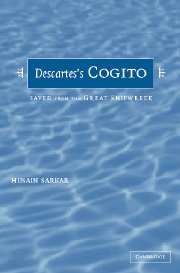Book contents
- Frontmatter
- Contents
- Preface
- Acknowledgments
- Abbreviations
- Descartes' Cogito
- 1 The Prolegomena to Any Future Epistemology
- 2 The Problem of Epistemology
- 3 The Solution: Cogito
- 4 A Skeptic against Reason
- 5 The Five Ways
- 6 Cogito: Not an Argument
- 7 The Content of the Cogito
- 8 Memory, Explanation, and Will
- Appendix A Comments on Jeffrey Tlumak's “Certainty and Cartesian Method”
- Appendix B Comments on Robert Nozick's “Fiction”
- Appendix C Cogito and the Port-Royal Logic
- Appendix D Bacon and Descartes
- Appendix E Comments on Anthony Kenny's “Descartes on the Will”
- Bibliography
- Name Index
- Subject Index
2 - The Problem of Epistemology
Published online by Cambridge University Press: 01 September 2009
- Frontmatter
- Contents
- Preface
- Acknowledgments
- Abbreviations
- Descartes' Cogito
- 1 The Prolegomena to Any Future Epistemology
- 2 The Problem of Epistemology
- 3 The Solution: Cogito
- 4 A Skeptic against Reason
- 5 The Five Ways
- 6 Cogito: Not an Argument
- 7 The Content of the Cogito
- 8 Memory, Explanation, and Will
- Appendix A Comments on Jeffrey Tlumak's “Certainty and Cartesian Method”
- Appendix B Comments on Robert Nozick's “Fiction”
- Appendix C Cogito and the Port-Royal Logic
- Appendix D Bacon and Descartes
- Appendix E Comments on Anthony Kenny's “Descartes on the Will”
- Bibliography
- Name Index
- Subject Index
Summary
In the structure of a philosophical system, the form is at least as important as the content. Part of what I wish to demonstrate, but only by implication, is that Descartes' hold on later philosophy has a great deal to do with its form, and perhaps less with its content. One can quibble, for instance, about whether Descartes has given us an adequate proof of the existence of God, or even of the existence of the external world. One can doubt that his reasoning is sound about the mind being a distinct and unique substance in its own right as matter, or doubt that he is right about their essential properties being thought and extension, respectively. But it would not follow that therefore his way of doing philosophy is inadequate. Descartes has provided a form, a way, a mode of doing philosophy that has not yet disappeared even if no one takes seriously, for example, the idea that the pineal gland in the brain is the meeting place of mind and matter. This chapter is as much about the form of that kind of philosophizing as it is about the specific issues in Descartes' philosophy.
Let me, at least once, draw an explicit parallel between the form of philosophy in Descartes and the form of philosophy employed by some twentieth century philosophers of science: Descartes was after not only truth, but also certainty; contemporary philosophers of science are after truth or probable truth.
- Type
- Chapter
- Information
- Descartes' CogitoSaved from the Great Shipwreck, pp. 33 - 57Publisher: Cambridge University PressPrint publication year: 2003



